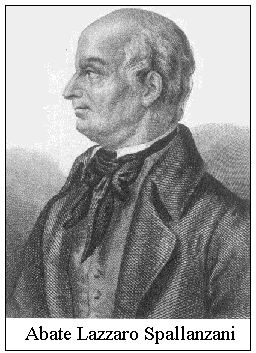Lazzaro
Spallanzani
Lazzaro Spallanzani (1729-1799), biologist and priest, taught at Reggio College in Emilia, and later at the University of Modena (1763); from 1769 on, he held the Chair of Natural Sciences at the University of Pavia. An unusually skilled experimentalist, he worked on some of the greatest and most important problems of biology, producing results of fundamental importance, which are still considered among the most significant in modern biology. He carried out a great deal of research on the reproduction and respiration of amphibians. Particularly memorable, among many minor works, are his studies on the ability of bats to orient themselves in darkness and to avoid obstacles, a capacity whose explanation has been discovered only in recent years; his studies on the electricity of the ray; his research in marine biology (at Portovenere he developed ideas about the animal nature of sponges); and many observations relating to descriptive zoology, mineralogy, geology, physics, etc., contained in the accounts of his voyages (Voyage to the Two Sicilies, 1792-97; Voyage to the Orient). In all the works of Spallanzani one admires, besides the excellence of the experimentation and the clear and precise formulation of problems in scientific terms, with no concessions to metaphysical interpretation, the remarkable mastery of the writer. He wrote at length to Alexandro Malaspina, who had asked him for advice on the zoological research to be completed during his Expedition.
For more information, see:
M. JIMENÉZ DE LA ESPADA, "Un autógrafo del abate Spallanzani," Anales de la Sociedad Española de Historia Natural, vol. I, Second Quarter, 1872, pp. 163-181.
J. ROSTAND, Lazzaro Spallanzani e le origini della biologia sperimentale, Torino, Einaudi, 1969.
P. DI PIETRO, Lazzaro Spallanzani, Modena, Aedes Muratoriana, 1979.
P. DI PIETRO, "Consigli naturalistici di Lazzaro Spallanzani per la spedizione scientifica Malaspina," Atti della Società Naturalistica e Matematica, Modena, no. 112, 1981, pp. 23-40.
Image courtesy of the Centro di Studi Malaspiniani, Mulazzo, Italy. Biographical and bibliographical notes by Dario Manfredi (Italian version), translated by John Black.
Updated: March 8, 2020